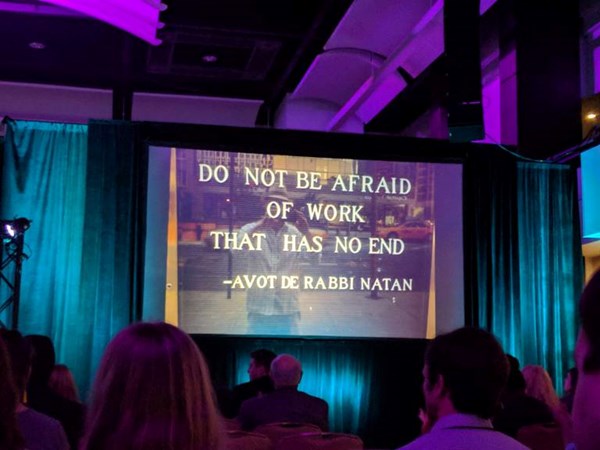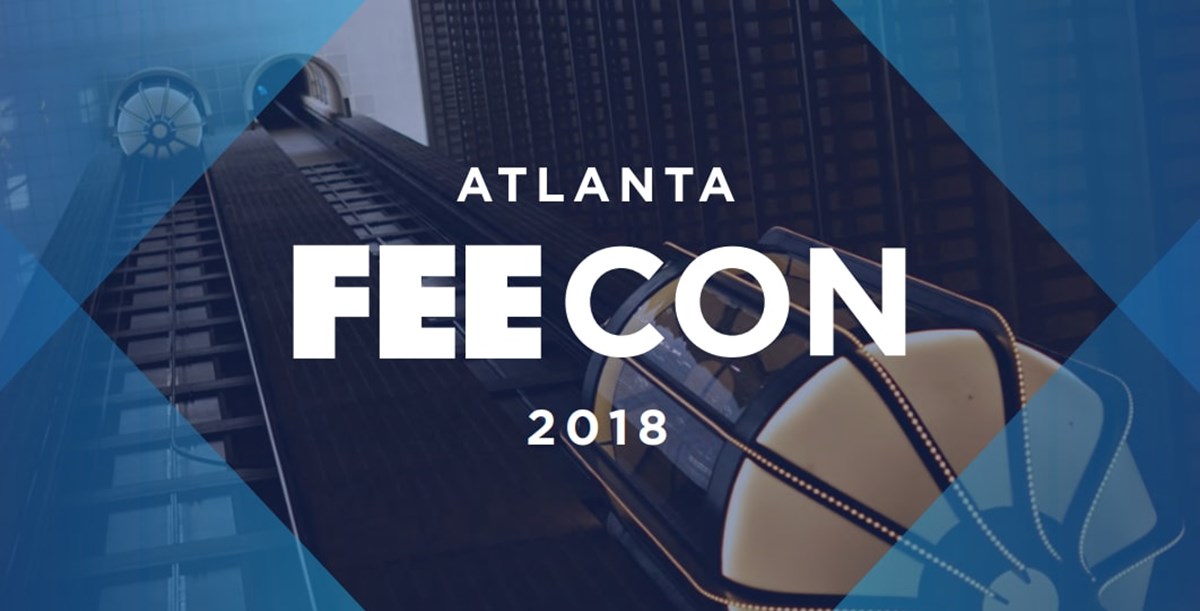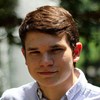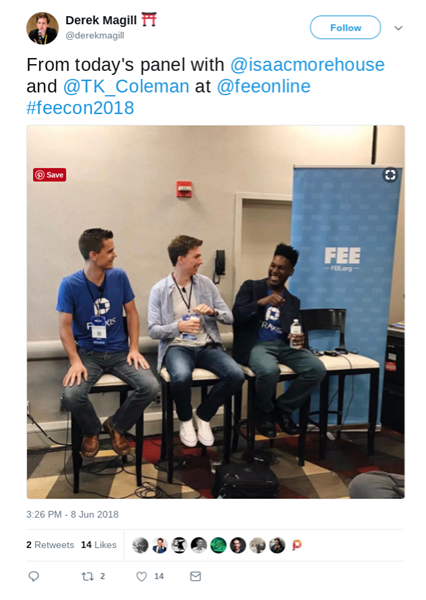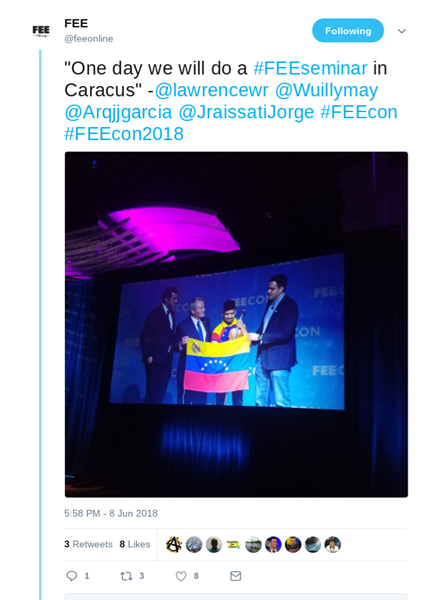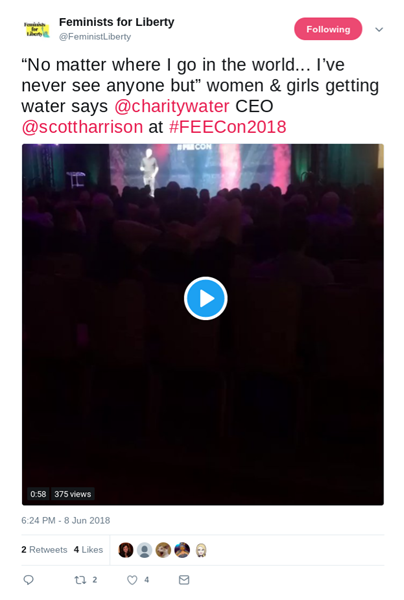I’m terribly proud of my friends at the Foundation for Economic Education (FEE). With FEEcon, they’ve put on an event which has brought together young people from all over the United States (and several other countries) to celebrate freedom and inspire action.
FEE put together a great track of speakers and content for this year’s FEEcon, and I was lucky to attend many on Friday. Here’s a short play by play of my Friday at FEEcon 2018.
Stop Asking Permission
I got to the beautiful Hyatt Regency for the conference shortly before noon and immediately saw an old pal on the escalator. I love that about conferences—I was going around giving big old hugs to people I haven’t seen in a year.
I arrived at a packed room for my first breakout session of the day, given by my Praxis friends (and, let’s admit it, heroes) Isaac Morehouse, Derek Magill, and TK Coleman. The title of the session was “Stop Asking Permission: How to Launch a Career that Doesn’t Suck.”
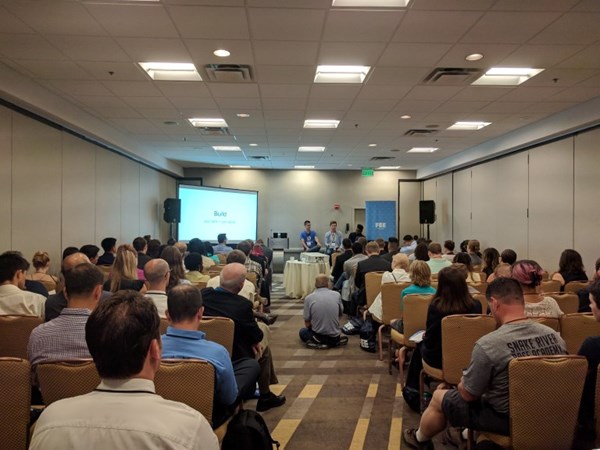
Some key takeaways for me:
- Forget FOMO and go all in if you have an opportunity. Don’t let an obsession with options blind you to opportunity. – Isaac and TK
- Broadcast your hustle. If you want people to see your passion, work ethic, and skills, don’t hide them. Make them a part of your personal brand on places like social media.
- Rough quote/paraphrase: “Human beings don’t care about your interests. There is no way to get around being creative with a value prop...” – TK
- Long-term goals can be a good reason to procrastinate and fail (why Isaac does not like long-term goals). It's good to have overarching values, but (rough quote/paraphrase) “If you don’t achieve [your long-term goals] everyone will let you off the hook, including yourself.” It's harder to let yourself off the hook if you keep your goals small and immediate. They build up. – Isaac
Taking Criticism
After a good chat with my man Nate Baker from Students for Liberty, I made my way to a panel in FEEcon’s creative track: “Honing Your Craft: Learning to Take Criticism from Trusted Mentors”:
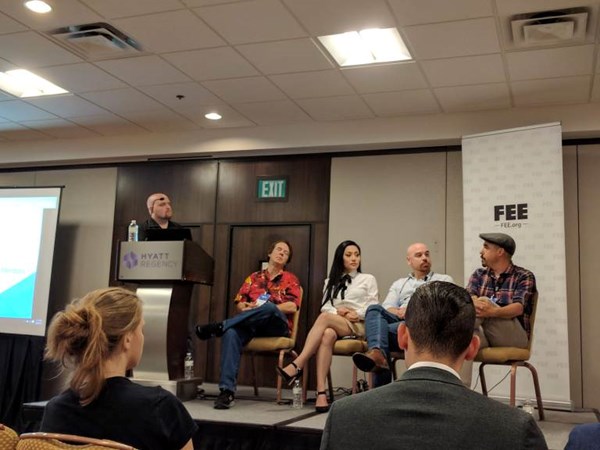
I missed cellist Tina Guo give a facemelting, bow-breaking performance earlier that day at FEEcon, so I didn’t want to miss her panel. (Here’s a bit from that performance.)
Tina, along with a Hollywood screenwriter, a Hollywood composer, and a photojournalist gave their advice and stories on feedback, mentorship, and failure in creative professions. Some key takeaways for me.
- If paralysis analysis is a problem, set deadlines.
- You’re going to have to translate the criticism and feedback you receive. Most people aren’t really meaning to communicate what their (often insufficient) language conveys. You have to figure out what they’re really saying.
- Photojournalist Lido Vizutti shared that he still tries to have other people edit his photos (rather than editing himself) so he can get feedback. Daily critique is a powerful tool.
- Practice a lot, and be prepared to fail a lot. Tina practices 4-6 hours per day and has had 7 failed band projects.
- Don’t assume that you’re intruding on people’s time when you make asks. Responding to asks is sometimes part of people’s job. If you’re helping to solve a problem, frame your asks that way.
- Rough quote/paraphrase from Tina: “Even if I don’t feel like getting out of bed, I have to or else I’ll starve.” That got some laughs, and it’s a good reminder.
- Rough quote/paraphrase from screenwriter Paul Guay on negative feedback: “If the universe is b****-slapping you, that’s a good thing. It’s the silence and indifference of the universe that’s the real problem.”
The Socialist Destruction of Venezuela
These conferences can sometimes feel a little too comfortable. We Americans have our problems, but we don’t face the same level of unfreedom common elsewhere.
The challenges of liberty that put a fire in my belly are happening abroad in places like Venezuela, which has been suffering under worsening socialist rule since the 70s. Three members of the Venezuelan opposition spoke in my next panel “The Socialist Destruction of Venezuela:”
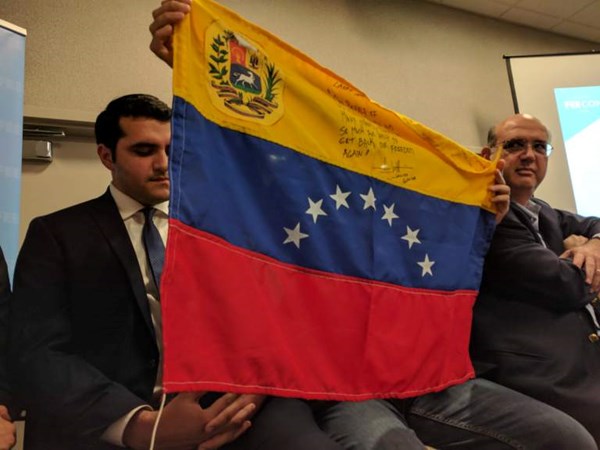
The panel shed some interesting light on how one of the world’s fastest-progressing countries became one of the world’s most dangerous and unstable places.
But it was also fully staffed with real bada**es, from the well-spoken young Jorge Jraissati (watch out for this guy—he’s going to do awesome things) to Luis H. Ball (who was once charged with treason and civil rebellion—wrongly, of course—for opposing Chavez) to Javier Garcia, who once obstructed the Venezuelan National Guard in the streets to protect innocents and who walked out of Venezuela to Colombia to escape to freedom.
Here are some of my key takeaways:
- Venezuela used to be a remarkably prosperous country. In the 60s, it produced 2/3 of the world’s oil exports, and the Venezuelan bolivar was once gold-backed and stronger than the Swiss franc.
- Even during the socialism of the 70s, there was still the freedom to criticize the state. To roughly paraphrase Luis Ball, “You felt freedom in Venezuela in those days.” With the rise of Chavez, that started to change.
- For Venezuela, Chavez marked the transition from socialism to communism. While Luis does not feel Venezuela is yet a totalitarian state, according to him, “[W]e already have the neighborhood spies.”
- Among other declines, the world’s top 10 most insecure cities now include 5 Venezuelan cities.
- The opposition movement in Venezuela is much bigger than the world press covers. To roughly paraphrase/quote Luis: “Tiananmen Square was a child’s game compared to what [the opposition] put on the streets since [maybe “in”?] the 2000s.”
- Rough quote/paraphrase: “The wealthy people are the most socialist ... [T]hey got used to being cronies of the government.”
- Rough quote from Jorge: “Fight now—do not wait until you live in a dictatorship.” Now, with media outlets in Venezuela nationalized, social media is pretty much the only way to express dissent in a mass media. But sometimes, the government pulls the power to counter this, apparently.
Office Hours Podcast Recording
After that, it was back to my Praxis pals TK and Isaac for a live recording of the first episode of the second season of their excellent podcast Office Hours.
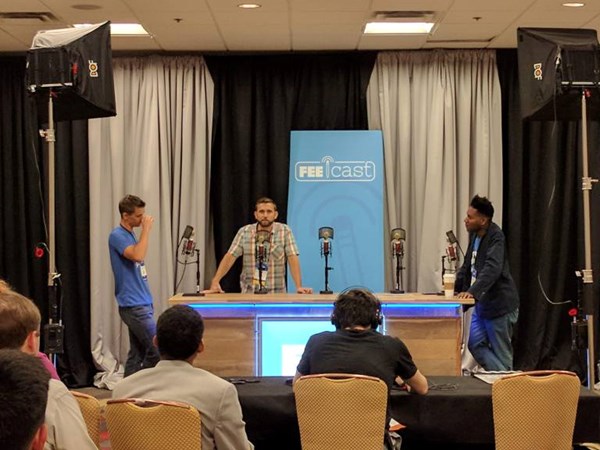
They riffed about working for free, the danger of envy, and the athletic mindset. I even got a question in (woot woot!), which prompted a guest appearance by Isaac’s brother (and my first office job boss) Levi Morehouse of Ceterus.
Wuilly Artega
My emotional high of the day came from seeing young violinist Wuilly Artega play for us. Wuilly is a young Venezuelan who was detained and tortured for his role in protesting (famously, by playing violin) against the communist government ruling Venezuela. Check out his story—this guy is a true hero:
Wuilly gave FEEcon 2018 its own epic and beautiful and sad violin performance set against a backdrop of the horrible images of the destruction in Venezuela.
Happily, he got a standing ovation and an encore, including a “Viva Venezuela” from me. FEE’s President Larry Reed was presented with a Venezuelan flag by Wuilly, Jorge Jraisatti, and Javier Garcia, and (in a move of true bada**ery) predicted that a future FEE seminar—devoted to free-market principles—would one day came to Caracas:
Closing Keynote
Charity:Water founder Scott Harrison gave a powerful closing keynote on the transformative power of clean water. I love Scott’s charity, and it’s solving the problem of unsanitary drinking water in some really creative ways.
Here are some key takeaways for me:
- 52 percent of all diseases in the developing world are caused by unsanitary water.
- 603 million people live with unsanitary water.
- People waste 40 billion hours yearly collecting often unsanitary water.
- Charity:Water is kicking a** at being a nonprofit (100 percent of public donations go to trackable, real work) Private donors supply its operational needs, which includes smart, sharp branding and design. As Scott put it:
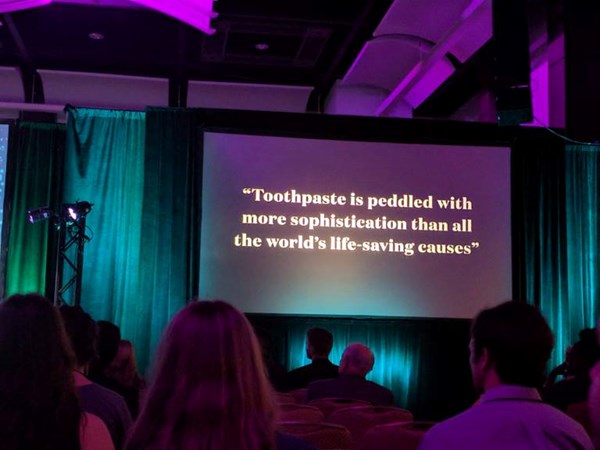
- Charity:Water (unlike other charities) celebrates its partners, donors, and volunteers as heroes. It does not position itself as the hero. This helps to win buy-in and enthusiasm.
For us economics nerds, thinking about the opportunity generated by an investment in clean water is a thing of beauty. To quote (roughly) Scott, “Imagine getting 49 hours back [per week]—just like that.” That’s the power of clean water. Consider this:
If you haven’t heard Scott’s story before, I recommend checking out one of his talks. Scott went from being a club promoter to bringing clean water to more than 8 million people around the world. Guy deserves a metal for dramatic redemptions/turnarounds.
Rounding Out the Day
I ended my day at FEEcon with a fabulously fun dance party hosted by America’s Future Foundation at the downtown Atlanta Sidebar where I hit the floor to dance with a bunch of young econ and liberty nerds from around the country and the world.
As usual, our Brazilian friends brought the best moves. We all laughed, smiled, cheered, and generally felt like a big happy family dancing at a wedding. It was something special, and it was a great way to celebrate freedom on a FEEcon 2018 Friday night.
We want to keep enjoying freedom and make the joys of freedom available to others. That’s not going to be easy, and most of us young people will be old and still going after it. So it’s worth ending with a quote which powers Scott Harrison at Charity:Water:
